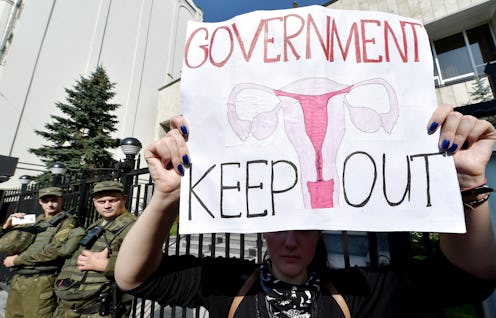
On Tuesday, in a vote that adhered to party lines, the House passed a 20-week abortion ban, meaning the bill will be heading to the Senate next. The bill, which was sponsored by Rep. Trent Franks of Arizona, is titled the "Pain-Capable Unborn Child Protection Act" and claimed that it "amends the federal criminal code to make it a crime for any person to perform or attempt to perform an abortion if the probable post-fertilization age of the fetus is 20 weeks or more." Anyone who deliberately violates the stipulation or fails to adhere to the rule will face "a fine, up to five years in prison, or both."
The bill has been strongly supported by Donald Trump's administration which said, according to a statement from the Office of Management and Budget, that the presidency "applauds the House of Representatives for continuing its efforts to secure critical pro-life protections." The thumbs-up from Trump's administration arrived on Monday.
This isn't the first time that the bill has made an appearance in the House. In 2015, the same bill appeared in the House, passed that stage, and headed toward the Senate where it was opposed and rejected by Senate Democrats. Trump has been clear about his support for pro-life stipulations like the aforementioned bill. On the presidential campaign in 2016, he vowed to sign the "Pain-Capable Unborn Child Protection Act" into law if it passed the Congress.
The future of the bill could materialize into a success if it gets the 60 votes it needs for passing. But it looks unlikely as the majority of Democrats oppose the bill.
Franks' sponsored bill does cite a few exceptions for cases when an abortion after 20 weeks would be permissible. But those exceptions are narrow and still exert remarkable control over women's bodies. In the cases of rape, incest, or when it is necessary to "save the life of the pregnant woman," the bill makes an exception for post-20 week abortion requests.
Furthermore, the bill fails to mention any kind of medical route or procedure for women who find fetal abnormalities after 20 weeks of being pregnant. Such a bill entirely neglects women who find out about fetal anomalies 20 weeks into their pregnancies. Accounts of such cases have been discussed at great length and shared by women all over the internet.
In fact, pregnancies that are terminated after 20 weeks are rare and the reasons for why they are ended are hard to determine, as research indicates. Senior researcher Rachel Jones of the pro-choice think tank Guttmacher Institute told Mother Jones that "surveys just don’t capture those women very well" partly due to the rarity of such abortions. The last time there was sufficient data on the subject was back in 2011. Research then indicated that nearly 13,000 women had abortions after 20 weeks of pregnancy. This number was out of a whopping 1.06 million terminated pregnancies.
There is a myriad of reasons as to why a woman would seek an abortion after 20 weeks. In many cases, lower-income women do not have the financial means to schedule an early abortion appointment. A poor woman might have to save money for one or two months to get an abortion. In some cases, young teens are entirely unaware of their pregnant status and by the time they do know, it could be 20 or more weeks in. In the case of traumatic events like rape or abuse, the 20 week ban also neglects and worsens their circumstances. The bill fails to consider the conditions of such human beings.
Proponents of banning abortion after 20 weeks argue that the fetus, at that stage, feels pain and that it would be inhumane to terminate it during that supposedly aware stage. But more than 2,000 studies published in the Journal of the American Medical Association came to the conclusion that it is "unlikely" for the a fetus to experience pain at the point.